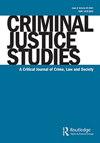探讨劳教人员工作-家庭冲突对工作压力、工作满意度和组织承诺的性别影响
IF 1.1
Q3 OPERATIONS RESEARCH & MANAGEMENT SCIENCE
引用次数: 0
摘要
摘要由于惩教工作的艰巨性,大量的研究考察了惩教人员的工作压力、工作满意度和组织承诺等因素。虽然这项研究是有价值的,但关于惩教工作如何对男性和女性产生不同影响的研究有限,尤其是对工作-家庭冲突(WFC)的研究。鉴于女性惩教机构工作人员的增加及其面临的障碍和冲突,本研究评估了基于压力和基于时间的WFC对西南两所州立监狱男女惩教人员工作压力、工作满意度和组织承诺的性别性质。研究结果显示,对男性和女性惩教人员来说,WFC的效果既有相似之处,也有不同之处。具体而言,基于压力的WFC是男性和女性狱警工作压力的显著预测因子,而基于压力和时间的WFC仅对男性狱警有显著性影响。最后,工作满意度的两个维度都与组织承诺无关。这些发现是在WFC和性别研究的背景下进行的。关键词:性别-工作-家庭冲突惩教人员工作压力工作满意度组织承诺披露声明作者未报告潜在利益冲突。家庭-工作冲突(FWC)是WFC的另一种形式(Netemeyer, Boles, & McMurrian, Citation1996)。FWC从家庭开始,在工作场所产生问题。例如,如果某人正在经历离婚,这可能会导致工作上的问题。关于女性进入监狱工作的完整评论,请参见Griffin的文章(Citation2013)。最初的调查没有包括对基于行为的冲突的测量——这是一个限制,稍后会解决。作者认识到,用性来代替性别是有局限性的。对性别的真正衡量应该包括所有的性别认同。这个问题将在关于限制的一节中进一步讨论。虽然它没有包括在结果部分,相关矩阵也不表明多重共线性是一个问题。作者简介:韦斯顿·j·莫罗,内华达大学里诺分校刑事司法系副教授。他获得了加州州立理工大学圣路易斯奥比斯波分校的社会科学学士学位;加州州立大学长滩分校刑事司法硕士学位;在亚利桑那州立大学获得犯罪学和刑事司法博士学位。他对第四修正案、警察使用武力、法庭和量刑以及少年司法进行了研究。莫罗博士的作品发表在《美国刑法杂志》、《刑事司法研究》、《刑法公报》、《犯罪与司法杂志》、《司法政策杂志》、《俄亥俄州立刑法杂志》和《警察季刊》上。Britni L. Adams,内华达大学里诺分校刑事司法系助理教授。她在加州大学欧文分校获得社会学博士学位。她的研究重点是受犯罪和刑事司法系统影响的家庭和青少年经历。具体来说,她研究的一个分支调查了与被监禁的家庭成员有关的家庭网络。她研究的另一个主要分支强调了家庭暴力和儿童虐待后的发展结果和关系的演变。她的作品发表在《人际暴力杂志》、《家庭关系》和《社会学指南》上。Samuel G. Vickovic,加州州立大学长滩分校犯罪学、刑事司法和应急管理学院副教授。他于2015年获得亚利桑那州立大学犯罪学和刑事司法博士学位。他的研究涉及媒体对医用大麻的描述、媒体对惩教人员的描述、惩教人员的组织态度和量刑差异。他目前的研究兴趣包括惩教人员和刑事司法系统,媒体和流行文化的交集。本文章由计算机程序翻译,如有差异,请以英文原文为准。
Exploring the gendered nature of work-family conflict on job stress, job satisfaction, and organizational commitment among correctional officers
ABSTRACTDue to the difficult nature of correctional work, a large body of research has examined factors like job stress, job satisfaction, and organizational commitment among correctional officers. Although this research is valuable, there has been limited research examining how correctional work may differentially impact males and females, which is particularly true for work-family conflict (WFC) research. Given the increase in females working in correctional institutions and the barriers and conflict they faced, the current study assesses the gendered nature of strain-based and time-based WFC on job stress, job satisfaction, and organizational commitment among male and female correctional officers from two Southwestern state-run prisons. The findings reveal that the effects of WFC were similar and different in some ways for male and female correctional officers. Specifically, strain-based WFC was a significant predictor of job stress for male and female correctional officers, whereas strain-based and time-based WFC was only significant for male correctional officers. Finally, neither dimension of WFC was related to organizational commitment. These findings are contextualized and explored against a backdrop of research on WFC and gender.Keywords: GenderWork-Family ConflictCorrectional OfficersJob StressJob SatisfactionOrganizational Commitment Disclosure statementNo potential conflict of interest was reported by the author(s).Notes1. Family-on-work conflict (FWC) is another form of WFC (Netemeyer, Boles, & McMurrian, Citation1996). FWC begins in the home and creates problems in the workplace. For example, if someone was going through a divorce, it may cause problems at work.2. For a full review on females entering prison work, see the article written by Griffin (Citation2013).3. The original survey did not include measures of behavior-based conflict – a limitation which is addressed later.4. The authors recognize that using sex as a proxy for gender is a limitation. A true measure of gender would be inclusive of all gender identities. This issue is further discussed in the section on limitations.5. Although it was not included in the results section, the correlation matrix also did not suggest multicollinearity was an issue.Additional informationNotes on contributorsWeston J. MorrowWeston J. Morrow is an Associate Professor in the Department of Criminal Justice at University of Nevada, Reno. He earned a B.S. in Social Science from California Polytechnic State University, San Luis Obispo; an M.S. in criminal justice from California State University, Long Beach; and a Ph.D. in criminology and criminal justice at Arizona State University. He has conducted research on the Fourth Amendment, police use of force, courts and sentencing, and juvenile justice. Dr. Morrow’s work has appeared in the American Journal of Criminal Law, Criminal Justice Studies, the Criminal Law Bulletin, the Journal of Crime and Justice, Justice Policy Journal, Ohio State Journal of Criminal Law, and Police Quarterly.Britni L. AdamsBritni L. Adams is an Assistant Professor in the Department of Criminal Justice at University of Nevada, Reno. She received her Ph.D. in sociology from the University of California Irvine. Her research focuses on family and youth experiences that are impacted by crime and the criminal justice system. Specifically, one branch of her research examines family networks who are connected to in incarcerated family member. The other main branch of her research highlights developmental outcomes and the evolution of relationships following family violence and child maltreatment. Her work has appeared in Journal of Interpersonal Violence, Family Relations, and Sociology Compass.Samuel G. VickovicSamuel G. Vickovic is an Associate Professor in the School of Criminology, Criminal Justice, and Emergency Management at California State University, Long Beach. He earned a PhD in Criminology and Criminal Justice from Arizona State University in 2015. He has conducted research concerning media depictions of medical marijuana, media depictions of correctional officers, correctional officer organizational attitudes, and sentencing disparities. His current research interests include correctional officers and the intersection of criminal justice systems, media, and popular culture.
求助全文
通过发布文献求助,成功后即可免费获取论文全文。
去求助
来源期刊

CRIMINAL JUSTICE STUDIES
OPERATIONS RESEARCH & MANAGEMENT SCIENCE-
CiteScore
2.80
自引率
5.60%
发文量
17
期刊介绍:
Criminal Justice Studies, a quarterly refereed journal, publishes articles that deal with substantive criminal justice and criminological issues. The journal welcomes all articles that are relevant to the issue of criminal justice, as well as those that may be outside the field but have relevancy to the topic of criminal justice. Articles that cover public administration, issues of public policy, as well as public affairs issues are welcome. The journal also publishes relevant literature reviews, research notes and summary reports of innovative research projects in criminal justice. Qualitative and quantifiable articles are sought mainly from academics and researchers in the field, though articles from professionals will also be considered.
 求助内容:
求助内容: 应助结果提醒方式:
应助结果提醒方式:


